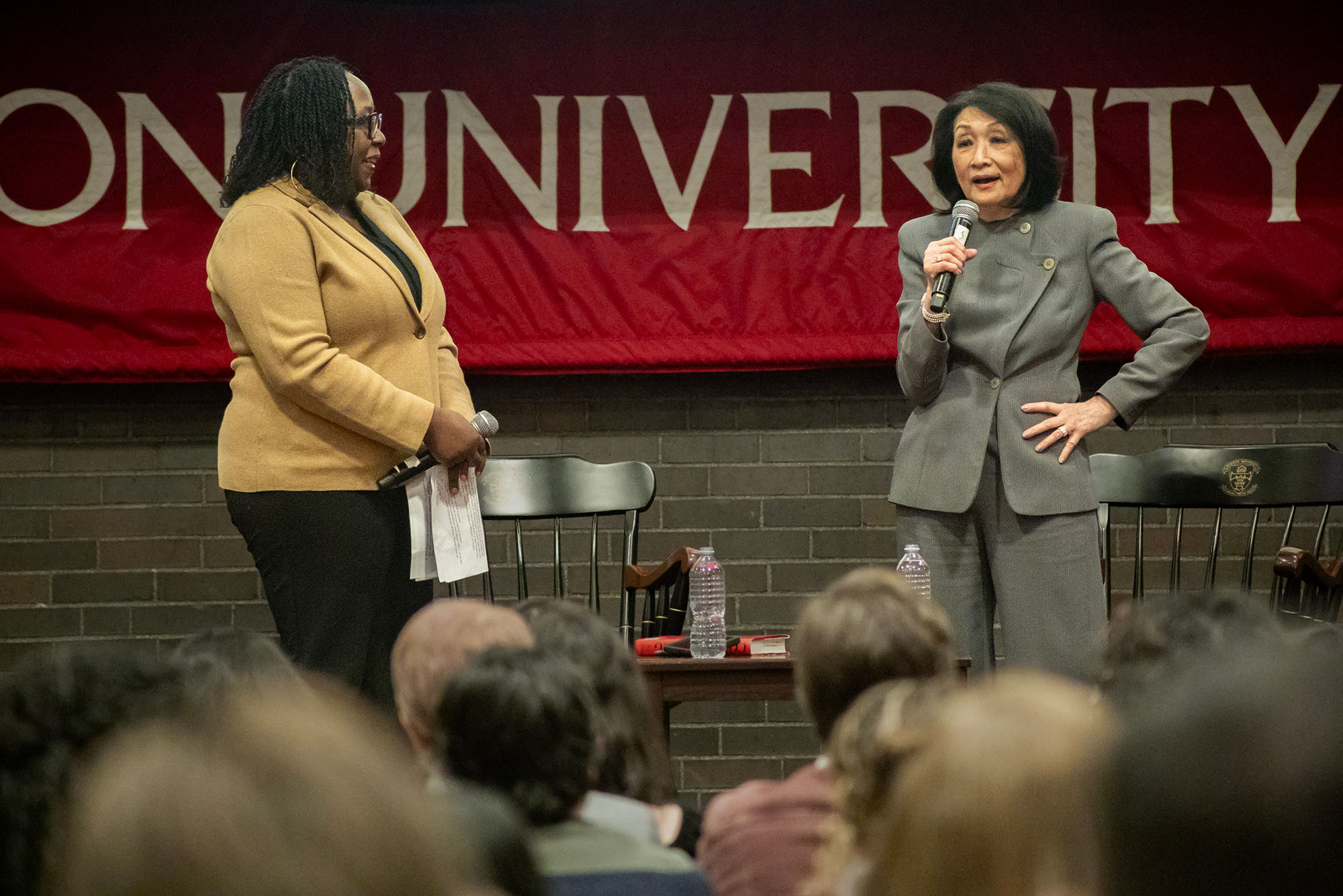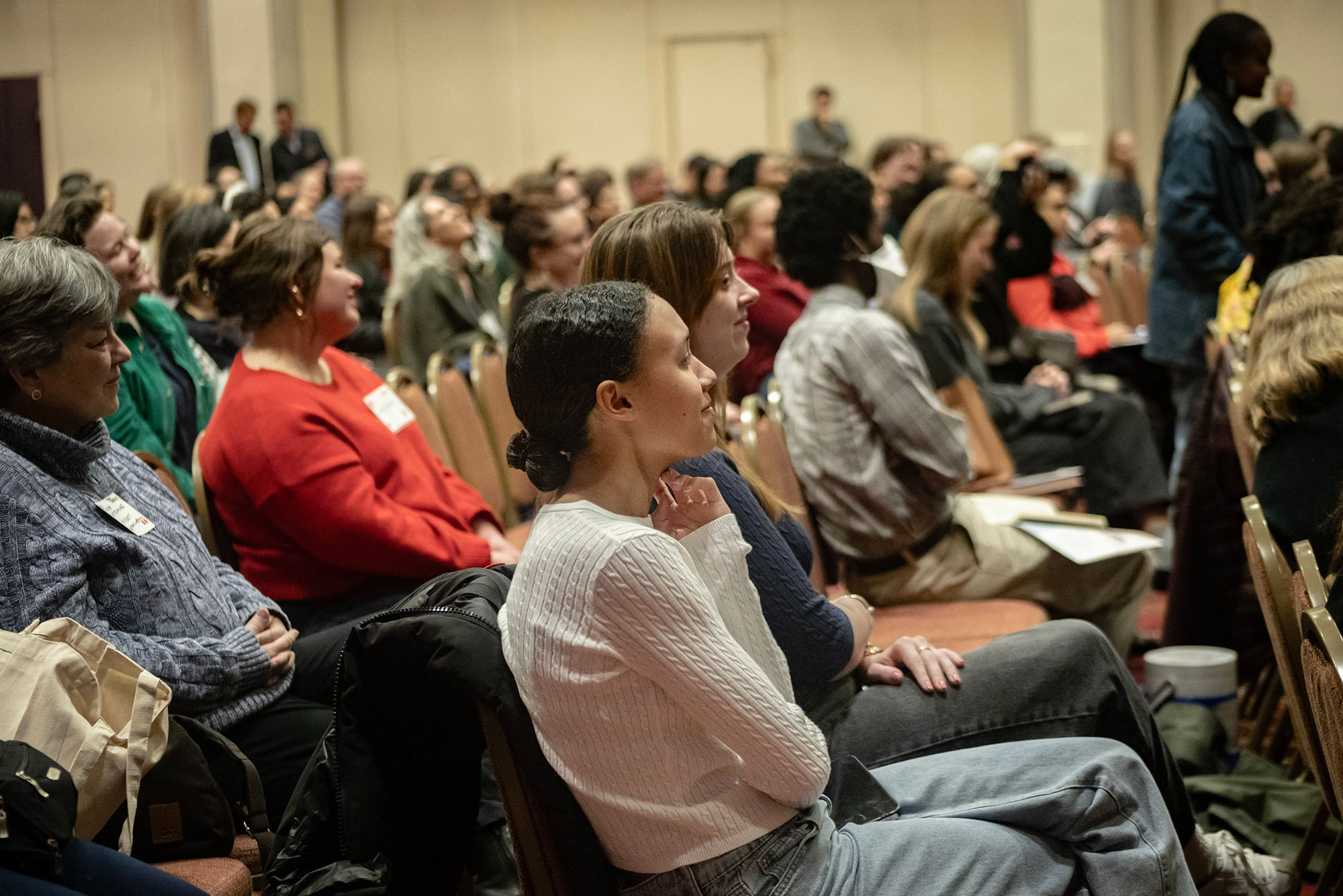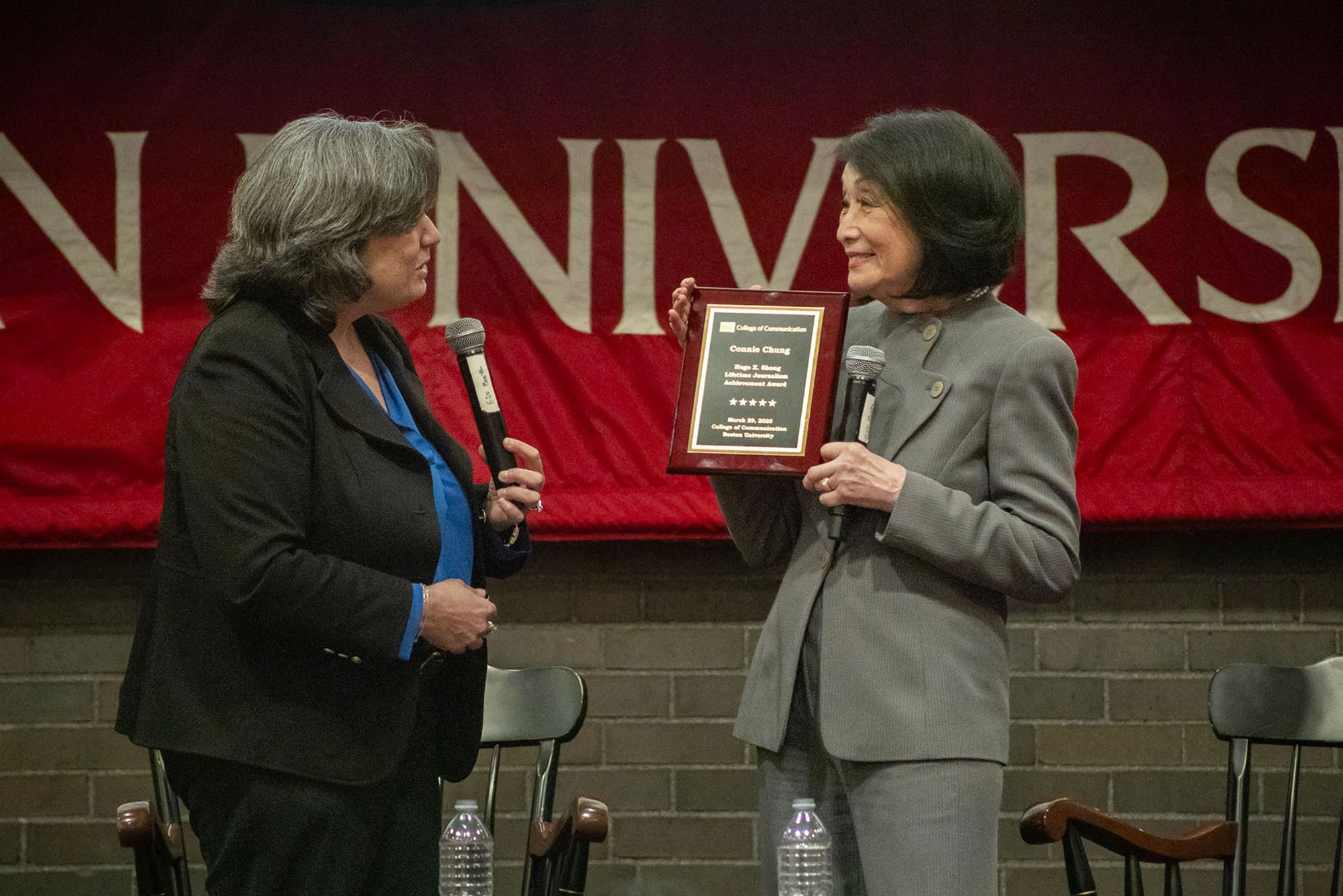Veteran TV Reporter Connie Chung Delivers Keynote at COM’s Narrative Conference
Journalists from around the world gathered at the GSU for two-day event covering topics from freedom of the press to the importance of local news

Connie Chung was interviewed on stage by Meghan Irons, a COM professor of the practice of impact journalism and an investigative reporter.
Veteran TV Reporter Connie Chung Delivers Keynote at COM’s Narrative Conference
Journalists from around the world gathered at the GSU for two-day event covering topics from freedom of the press to the importance of local news
Trailblazing television journalist Connie Chung traveled to Boston last weekend to deliver the final keynote address at the College of Communication’s annual Power of Narrative Conference, an annual two-day event that this year explored the power of true storytelling in an age of constant breaking news alerts.
Chung was the first woman coanchor of the CBS Evening News and the first person of Asian descent to anchor any news program in the United States. She filled her hour on stage with powerful and amusing anecdotes from her storied career. She recalled starting that career in the Washington bureau of CBS and competing against a “sea of men,” referring to both the journalists she worked alongside and the politicians they were vying to interview.
“I thought, if I can’t be one of them, I will take pages from their playbook,” said Chung, winner of three national Emmys, a Peabody Award, and numerous other accolades. “I grew a few sets of balls. I took on their vibrato, I walked into a room with confidence. I had a potty mouth. I just behaved the way they did… I had to find a way to keep my head above water.”
The Power of Narrative conference is designed to combine practical advice with big-picture visions for nonfiction storytellers, according to conference director Mitchell Zuckoff, COM’s inaugural Sumner M. Redstone Professor in Narrative Studies. The event, held at the George Sherman Union, brought hundreds of journalists to campus, among them New Yorker staff writer Susan Orlean, Pete Luna, general manager of the Uvalde Leader-News, and Joel Simon, founding director of the Journalism Protection Initiative at the City University of New York’s Craig Newmark Graduate School of Journalism. BU student journalists received free tickets.
Breakout sessions explored topics like creating compelling narratives, with the Boston Globe’s Spotlight Team, balancing trust and truth in storytelling, and hearing from community journalists who have covered tragedies close to home. Attendees could also sign up to meet one-on-one with literary agents and get tips on making a great magazine pitch.
About 300 journalists attended Chung’s keynote in the GSU Metcalf Ballroom, where she was interviewed on stage by Meghan Irons, a COM professor of the practice of impact journalism and an investigative reporter. Chung told the audience that her husband—veteran talk show host Maury Povich—gave her the idea of writing her life’s story, which became Connie: A Memoir (Grand Central Publishing, 2024). The book, published last September, quickly became a national bestseller and a New York Times Editors’ Pick and was named one of that paper’s 100 notable books of 2024.

“He was the person who was always there for me when I was in the news business and having such a hard time because it was so male-dominated,” said Chung, 78, who has worked for all the major networks, including CBS, NBC, ABC, and CNN, where she covered a wide array of stories, from the Watergate scandal to interviewing basketball star Magic Johnson after he went public with his HIV-positive status. She said Povich told her: ‘Don’t pay attention to anyone, just do it.’”
For inspiration, he recommended that she read the 1998 Pulitzer Prize–winning memoir by Katharine Graham, the first woman publisher of the Washington Post, who oversaw the paper’s coverage of the Pentagon Papers, for inspiration. “She was never woe-is-me,” Chung said. “I tried to [write] it with a dose of humor.”
And that she did. The Times described her writing style as often having “irreverent humor,” and during her talk at BU, Chung was quick-witted, sassy (her words), and had lots of great one-liners. At one point, she stopped mid-sentence and asked the conference’s videographer to move to the opposite side of the room “to get her good side,” at another, she encouraged everyone in the audience to try the strain of weed named after her, and she described her husband as the man who once “determined the paternity of every child.”
Chung, whose parents were Chinese immigrants, recalled growing up the youngest of nine children and that her parents had lost five babies before her and had no surviving sons. She said that at one point her father wrote her a letter saying that maybe she could carry on the family name and “basically be the son that [her] parents never had. I took that seriously. I decided that I would try and chisel the name Chung in history.” Serendipitously, Chung was so inspirational that a generation of Asian American girls were named Connie after her, the New York Times reported in 2023.
Irons asked Chung whether she believed things had changed for women in journalism in the decades since she started her career. Her response: although she had thought there have been sizable steps, as of late, women and minorities have taken a giant step back. “We’ve been put in a bad position by the climate that emerges from Washington,” she said. “I’m worried.
“This is the least desirable time for us to be quiet,” she continued. “It’s especially important for the fourth estate because we speak truth to power,” a remark that drew applause from the audience. “This is the most important time for us to speak out and to investigate reports, because there are so many things to uncover,” specifically citing the recent Signalgate scandal, which she called unfathomable.
Despite her many successes, Chung said that her career did not always proceed smoothly. She scored her dream job, cohosting the CBS Evening News with Dan Rather (Hon.’83), only to be unceremoniously “dumped” two years in at Rather’s request. “He never wanted a man, a woman, or a dog to sit next to him,” Chung said to laughter. “He wanted the chair to himself.”
“Most anchormen suffer from what I call ‘Big shot-itis.’ They have incredibly huge egos… My impression was that they felt it was egregious that a woman would have the audacity to sit in the chair next to them and think they were equal.”
Years later, Chung ran into Rather on a train and they sat together, only because, she said, she was afraid she’d cause a scene by sitting somewhere else. He asked Chung, “No hard feelings?” to which she bit her tongue. “He was really the worst,” she said.

Following her keynote, Chung was presented with the 2025 Hugo Shong Lifetime Achievement Award, named in honor of Hugo Shong (COM’87), a BU trustee and founding chairperson of International Data Group. The award, presented by COM Dean Mariette DiChristina (COM’85), is given by the College of Communication to a journalist whose body of work and contributions to the field exemplify the highest quality of reporting and analysis and ethical standards of the profession. Previous recipients include former White House photographer Pete Souza (COM’76) and former New York Times editor in chief Dean Baquet.
Irons opened up the floor to the audience at the end of the event, and one question came from a BU staffer who is a part-time graduate student in COM’s journalism program. “I was adopted into a Japanese-American family when I was seven, and they are currently mortified that I want to be a journalist,” she said. “What should I say to them to convince them?”
“Our mission as journalists is to speak the truth,” Chung said. “Every administration has lied to the American public… We are fair, and why don’t you tell them, ‘I’m the product of your honesty. You have taught me that I must tell the truth. And I must always be critical, honest, and fair.’ That’s journalism!”
With that, audience members rose to their feet and gave her a standing ovation.
Correction: An earlier version of this story stated that BU student journalists received heavily discounted tickets, but they were in fact free.

Comments & Discussion
Boston University moderates comments to facilitate an informed, substantive, civil conversation. Abusive, profane, self-promotional, misleading, incoherent or off-topic comments will be rejected. Moderators are staffed during regular business hours (EST) and can only accept comments written in English. Statistics or facts must include a citation or a link to the citation.